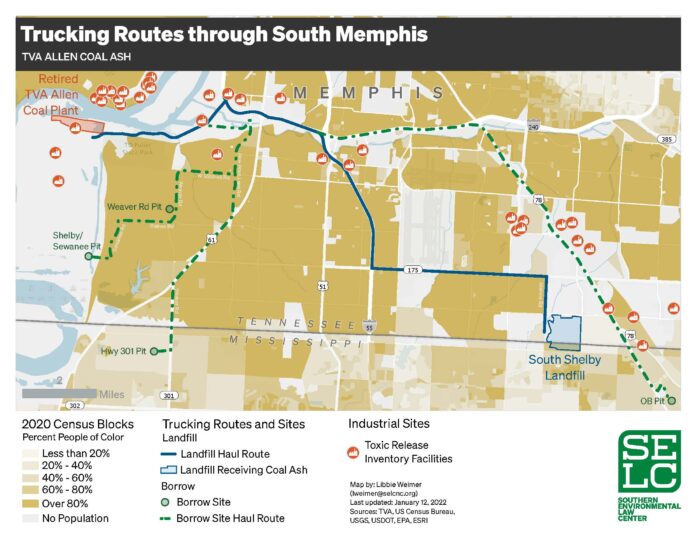Records request reveals TVA hid controversial coal ash plan for months
The Tennessee Valley Authority waited at least six months to tell the public – including affected communities and city leaders – about its plans to truck toxic coal ash created at its Allen Fossil Plant to the South Shelby Landfill in south Memphis, according to an email obtained by the Southern Environmental Law Center through public records requests.
In the email, which is dated January 26, 2021, an employee with the Tennessee Department of Environment and Conservation wrote that TVA had initially planned to announce its coal ash disposal plans the next day, but the utility “decided to postpone the announcement.” TVA ultimately kept the public in the dark about the finalized plan until July 2021 – nearly six months after that email and just before the utility obtained key authorizations from TDEC. TVA began moving coal ash to the South Shelby Landfill in late 2021.
“TVA’s choice to hide its coal ash disposal plan for nearly six months is just the latest example of the many ways the agency has worked to stifle public input,” says Tennessee Office Director Amanda Garcia. “Throughout the decision-making process, TVA stripped local communities of the opportunity to receive important information about how this plan would impact them and their neighbors.”

TVA’s decision to truck the toxic coal ash to the South Shelby Landfill has drawn sharp criticism from community and environmental groups, including SELC, which has continued to challenge the process since it was finally announced in July of last year.
The plan is based off a flawed review process that suppressed meaningful public input, failed to consider viable alternatives, and lacked adequate, site-specific studies. Instead of clearly disclosing the impacts of using trucks to dispose of the coal ash at the South Shelby Landfill to nearby neighborhoods, TVA studied a generic “environmental justice community.”
This broad and incomplete analysis leaves out significant information, preventing the public – and the agency itself – from fully understanding the effects of its decision. The result is a plan that will impose nearly a decade of additional traffic, air pollution, and public safety impacts on predominantly Black communities and low-wealth areas in south Memphis already overburdened with pollution.
It is infuriating that TVA attempted to continue that legacy of environmental injustice by hiding its coal ash disposal plans and locking the public out of this extremely important decision.
Justin J. Pearson, Co-Founder of Memphis Community Against Pollution
Because of these long-term impacts, it is critical that these communities know details about the coal ash disposal plans and have a meaningful role in the decision-making process.
“Predominantly Black communities in south Memphis are already forced to deal with more than our fair share of industrial pollution – including pollution from nearly 60 years of burning coal at the Allen Fossil Plant,” says Justin J. Pearson, Co-Founder of Memphis Community Against Pollution. “It is infuriating that TVA attempted to continue that legacy of environmental injustice by hiding its coal ash disposal plans and locking the public out of this extremely important decision.”
Coal ash is the toxic byproduct of burning coal and it contains dangerous chemicals like arsenic, selenium, and mercury. The state has ordered TVA to dispose of the 3 million tons of coal ash that currently sits in unlined pits outside the Allen Fossil Plant, where it threatens to contaminate the Memphis Sand Aquifer, Memphians’ drinking water source.
It is critical that this coal ash be removed, but it is also important that communities affected by the disposal have their voices heard. All of these crucial priorities can be accomplished.
SELC protects our water and health from coal ash.
“Protect Our Aquifer has been advocating for the coal ash to be moved from the Allen Fossil Plant for years, and we expected TVA to reduce impacts to the Aquifer and communities surrounding the site throughout its state-ordered process,” says Executive Director of Protect Our Aquifer, Sarah Houston. “However, every comment letter, concern, and request for more information from POA has been denied or ignored. Knowing that TVA kept their final decision secret for six months reduces our confidence TVA has any intention of meaningful dialogue to protect our aquifer and communities.”
In order to correct its flawed decision-making process, TVA must perform a supplemental environmental impact statement. This would allow for meaningful public input, site-specific analysis, and consideration of alternatives that could reduce impacts on nearby neighborhoods.
